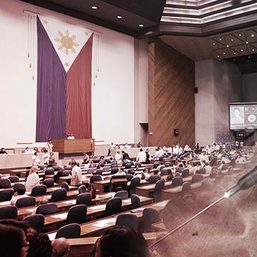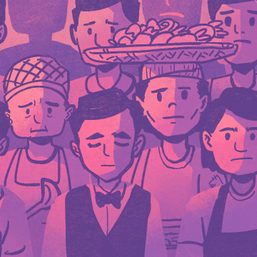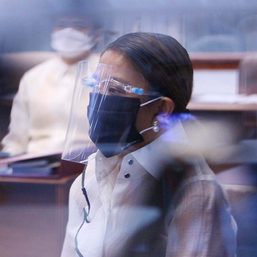SUMMARY
This is AI generated summarization, which may have errors. For context, always refer to the full article.
![[OPINION] Who writes the narrative on our environmental and climate reality?](https://www.rappler.com/tachyon/2020/07/imho-op-ed.jpg)
As we finish the fourth year of the current administration, the climate and environmental state of our nation has never faced more serious threats. The COVID-19 pandemic has provided a recent temporary relief for our environment, as pollution of land, air, and water has decreased with a lockdown-induced reduction of all human activities. However, this should instead be viewed as a reminder of the consequences of shortsighted, profit-driven, destructive activities on planetary and human health, a reminder that we must not return to the “normal” we knew.
It is disappointing to observe that characteristics of the previous “normal” still prevail in many government programs, projects, and activities. While there is no such thing as a “perfect solution” and progress has been made on addressing certain problems, some of the proposed solutions to address urgent economic, social, and environmental issues may actually cause more harm than good.
Whether in rehabilitation efforts, construction of engineered solutions, transitions into more sustainable modes of transport, or developing new subdivisions and cities, Filipinos must learn to look deeper, beyond the perceived benefits of these endeavors, and understand the costs of ignoring the rights and welfare of marginalized sectors, ecosystems, and biodiversity, and their immediate and long-term impacts on our national development.
For the past few administrations, positive change for the marginalized and the environment have been repeatedly stated as priorities. Yet translating words into actions has often fallen short. It is always the poorest and most vulnerable sectors that are at highest risk of being left behind, which goes against the intentions of national development plans.
The outlook for climate and environmental action in the Philippines is a mixed bag. The 2020 Sustainable Development Report reveals that climate action (SDG 13) is on track to be achieved by 2030, a sign of the country’s commitment for adaptation and mitigation to address humankind’s self-inflicted threat. However, progress on achieving ecosystem and biodiversity resilience is not positively trending, increasing the risk of the degradation of life below water (SDG 14) and on land (SDG 15). Significant challenges also remain with achieving affordable and clean energy (SDG 7).
Contributing to this stagnating progress in national sustainable development is the implementation of what is considered to be model legislation on environmental protection and climate action, which remains uneven and inconsistent. Despite public pronouncements, renewable energy development is still lagging behind in favor of pollutive coal, which is nowhere near as low-cost as proponents state as they ignore its damage to ecosystems and communities.
Time and time again, the ecological relationship between human beings and the environment that is integral to the Philippines’s economic, social, and cultural identity has been compromised to favor elitist interests. For a country often regarded for its riches of natural resources, socioeconomic inequality seems to grow only wider.
Our country, already archipelagic by nature, has arguably never been this divided. At a time when we need true political will, we often see leaders opting to point fingers instead of providing sensible answers and solutions. Sides are being created in a world that naturally has none. The climate and environmental crises do not choose sides, either.
Always remember that any development without a development in human values is unjustified. If we want our nation and our world to avoid making the same mistakes that has marked our collective history, we must uphold the highest human right of all: the right to life. A healthy environment is integral to a high quality of life, which is not just defined by monetary wealth and technological advancements, but also by a culture of harmonious rather than antagonistic living with others, humans and non-humans alike. Human dignity is sustained through respect to life and where it comes from, which is reflected in the right of every Filipino to “a healthful and balanced ecology in accord with the rhythm and harmony of nature,” under the Philippine Constitution.
This era in our history calls us to stand up for the truth, to recognize the realities we are facing, and to unite and become more active in addressing the most difficult climate and environmental challenges of our time. We must demand inclusivity, transparency, and accountability in holistic approaches that public authorities and private entities utilize in their operations, to maintain ecological balance and integrity in pursuit of sustainable development. The survival of the Filipinos and all peoples in our common home depend on it.
We as Filipinos should know by now our environment and climate reality, and we must not allow the few with vested interests to write the narrative for us. The state of our nation, our lives is not a movie where we can only pay to watch others shape the production, the direction, and the story of us. We get to control how this narrative ends, continues, and begins again. – Rappler.com
John Leo is the Program Manager of Living Laudato Si Philippines and Climate Action for Sustainability Initiative (KASALI). He is one of the most active Filipino Climate Reality Leaders, trained in Manila in 2016. He has been a citizen journalist and feature writer since 2016.
Add a comment
How does this make you feel?
![[OPINION] The narrative of Jesus’ crucifixion and the death penalty](https://www.rappler.com/tachyon/2020/07/crucified-peoples.jpg?resize=257%2C257&crop_strategy=attention)

![[OPINION] Courageous and compassionate are those who resist the tyrant’s might](https://www.rappler.com/tachyon/2020/07/courageous-those-who-resist-tyrants-might-July-30-2020.jpg?resize=257%2C257&crop_strategy=attention)


There are no comments yet. Add your comment to start the conversation.